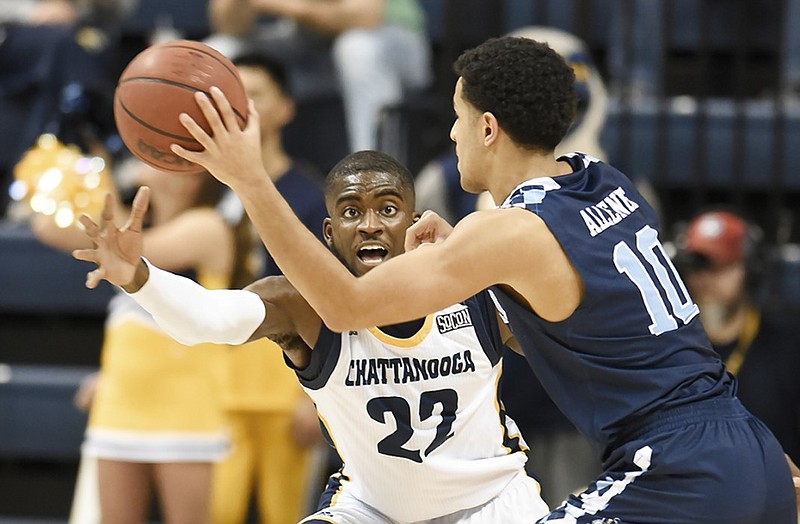Despite not hearing his name called during last week's NBA draft, Makinde London won't be returning to the University of Tennessee at Chattanooga basketball program. Though some folks believe it should be otherwise - including Steve Kerr, the coach of the two-time NBA defending champion Golden State Warriors - NCAA rules don't allow anyone remaining in the draft pool on draft night to return to school if they're not selected.
So London, who would have been a senior during the 2018-19 school year, joined a long list of pretty talented underclassmen - including Duke's Trevon Duval, Malik Newman of Kansas, Kentucky's Wenyen Gabriel, Texas A&M's Tyler Davis and D.J. Hogg and Arizona's dangerous duo of Rawle Alkins and Allonzo Trier - whose college careers are done, despite having no assurance they'll earn a pro paycheck this coming season.
"One of the things the NCAA needs to look at is, if a kid signs with an agent and he doesn't get drafted, welcome him back," Kerr told ESPN late last season. "Why not? What's the harm? We talk about amateurism and all this stuff, but if you're truly trying to do what's right for the kid, and the kid declares for the draft and doesn't get drafted, welcome him back. Do something good for the kids."
It's a strong argument. They're still kids - nine of the first 10 college players selected last week had just completed their freshman years - and if they were given bad advice about where they'll be chosen, or they simply made a boneheaded decision, what would be the harm in giving them a second chance, which the NCAA actually did 15 years ago.
After all, according to CBSSports.com, 125 rising sophomores, juniors and seniors kept their names in the draft, despite it having only 60 total spots and some of those going to graduating seniors, foreign players and a couple of young men who had never gone to college but were old enough to qualify for the draft.
Simple math tells you that those numbers guarantee there will be more disappointed young men than happy ones and that the vast majority of those unhappy hoopsters should have stayed in school.
Just don't count London's college coach - Lamont Paris - as one who necessarily believes the current system is all that flawed.
"In theory, (letting them come back to school) it makes sense," Paris said Tuesday as he prepared to put his current Mocs through a summer workout. "But if you can come back if you don't get drafted, everybody will do it. And why not? But if someone has told you they're going pro, and you sign another player to take their place, what then?
"My personal opinion is that most of them are getting good advice now from NBA scouts and their coaches (concerning whether to stay in the draft). But too many of them listen to who they want to listen to. Nine people may tell them they need to go back to school, but if the 10th one says he thinks they might be a good fit, they're gone."
While the overall numbers back him up, there were more than 60 players who withdrew their names from the draft, including Tennessee forward Admiral Schofield, North Carolina forward Luke Maye and Kentucky forward P.J. Washington.
Said Schofield of that decision with words that were strongly echoed by Maye and Washington: "I'm happy to announce that I'll be returning to Tennessee, and I am focused and hungry to once again chase championships with my teammates."
That used to be every college player's goal - to chase championships. But Paris and others worry that keeping up with the Joneses regarding a quick entry to the NBA has begun to overtake the desire to march through March.
"They see some guy they think they're better than go pro, and they think they have to go," Paris said. "They think they're a failure if they don't declare for the NBA as soon as possible. Listen, if you go to the combine or a tryout and stink up the place, you need to go back to school. Maybe you just can't play at that level. Maybe you're just not quite ready. But either way, there are far worse things than playing major college basketball for another year."
That said, Paris believes London will wind up somewhere.
"He's got a 7-3 wingspan, he can shoot the 3. Someone is going to give Makimbe a chance," Paris said.
And he's right. If the player has enough talent and toughness, someone, at some professional level of the sport, will give him an opportunity.
But Kerr also has a point about doing what's best for the kid. The problem comes when you begin to analyze whether it's better for these young men to learn a painful lesson from their ignorance and stubbornness or be given a second chance to correct a monstrous mistake.
Theoretically, both positions make sense. But what if you were the kid who signed thinking you were replacing a guy on his way to the NBA, but he unexpectedly returned? What would you think then?
Contact Mark Wiedmer at mwiedmer@timesfreepress.com
